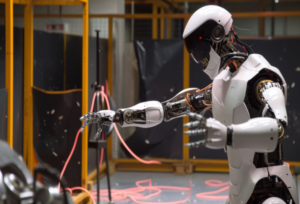The arrival of Industry 5.0 marks a transformative era, emphasising collaboration between humans and intelligent systems. Unlike Industry 4.0, which focused on automation and efficiency, Industry 5.0 highlights human creativity, ethical values, and sustainability. This shift demands a workforce with technical proficiency, emotional intelligence, ethical reasoning, and adaptability. Preparing graduates for this future requires concerted efforts from both education institutions and industries. Together, they must create pathways that blend technical knowledge with human-centric skills, ensuring the next generation is equipped to lead in this new paradigm.
Understanding Industry 5.0
Industry 5.0 represents a shift towards a human-centered industrial landscape. It focuses on collaboration between humans and machines, prioritizes sustainability, and emphasises creative problem-solving. While Industry 4.0 sought to replace human effort with automation, Industry 5.0 aims for symbiotic partnerships between humans and intelligent systems. Graduates entering this workforce must possess a balanced skill set—combining technological expertise with the ability to innovate and address global challenges. To meet these demands, education institutions and industries must align their efforts to prepare a generation that thrives in this collaborative, forward-thinking environment.
The Role of Education Institutions
Reshaping Curricula to Meet Industry Needs
Education institutions must redesign curricula to address the demands of Industry 5.0. This involves integrating emerging technologies such as AI, robotics, and blockchain alongside human-centric skills like creativity, empathy, and ethics. Additionally, fostering global perspectives through cross-cultural and interdisciplinary studies is essential. Leading institutions are already incorporating these elements into their programs, creating graduates who are not only technically proficient but also capable of ethical reasoning and innovation in a globalized context.
Interdisciplinary Learning for Holistic Skill Development
Industry 5.0 thrives on breaking down traditional academic silos. Education institutions must promote interdisciplinary learning by encouraging collaboration across fields like engineering and psychology, data science and environmental studies, and design thinking and business. This approach equips students with the ability to tackle complex problems from multiple angles, a critical competency in a world where technological and human elements converge to address societal challenges.
Cultivating Creativity and Innovation
Innovation lies at the heart of Industry 5.0, making it imperative for universities to foster creativity. This can be achieved by establishing innovation hubs where students tackle real-world problems, hosting competitions like hackathons, and providing research opportunities in cutting-edge fields. These initiatives allow students to shift from being passive learners to active creators of solutions, preparing them to lead in an innovation-driven workforce.
Fostering Lifelong Learning
In a rapidly evolving technological landscape, the ability to learn continuously is vital. Universities must promote lifelong learning through flexible online platforms, modular courses, and opportunities for alumni to upskill. Partnering with platforms like ExpertGate can provide diverse, accessible learning options, ensuring that graduates remain relevant and adaptable throughout their careers. This commitment to ongoing education aligns with the ethos of Industry 5.0, where growth and adaptation are paramount.
The Role of Industry
Aligning with Education: Co-Creating Curricula
Industries play a critical role in shaping education by collaborating with institutions to co-create relevant curricula. By identifying skill gaps and emerging trends, industries can ensure that academic programs are aligned with real-world needs. Guest lectures, workshops, and joint program development offer students practical insights, bridging the gap between theoretical learning and workplace demands.
Providing Real-World Exposure
Hands-on experience is essential for students to navigate Industry 5.0’s complexities. Industries can offer internships, apprenticeships, and work-integrated learning programs, allowing students to gain practical experience in live projects. Simulations and case studies further enhance their ability to solve real-world problems. Such initiatives build confidence and ensure that graduates are ready to contribute effectively from the outset of their careers.
Mentorship and Professional Guidance
Experienced professionals can significantly impact students through structured mentorship programs. These initiatives provide personalized career guidance, help students understand workplace expectations, and foster valuable professional networks. By connecting students with mentors, industries can nurture a workforce that is not only skilled but also confident and well-prepared for future challenges.
Promoting Research and Innovation
Collaborative research between academia and industry is a cornerstone of progress in Industry 5.0. Industries can sponsor university research, establish joint labs, and provide funding for experimental projects. These collaborations address pressing global challenges while equipping students with the tools and insights needed to innovate and drive change in their respective fields.
ExpertGate’s Contribution to Industry 5.0 Talent Development
ExpertGate is a pivotal platform connecting academia and industry, leading the way in preparing graduates for Industry 5.0. By offering access to world-class experts, customizable learning opportunities, and collaborative research platforms, ExpertGate bridges the gap between theoretical knowledge and practical application. Its commitment to reinvesting 50% of profits into educational initiatives ensures inclusivity and societal impact, empowering underprivileged communities while advancing Industry 5.0’s human-centric goals. Through its innovative approach, ExpertGate enables graduates to excel in a technology-driven world without compromising on creativity or ethics.
A Collaborative Approach to Shaping the Future
Industry 5.0 offers an unparalleled opportunity to redefine how humans and technology coexist, emphasizing creativity, ethics, and sustainability. Realizing this vision requires a unified effort from education institutions and industries. Universities must innovate their curricula, foster interdisciplinary learning, and promote lifelong education. Simultaneously, industries must provide real-world exposure, mentorship, and research opportunities. Together, these stakeholders can create a future-ready workforce capable of driving Industry 5.0’s transformative goals. Platforms like ExpertGate further enhance these efforts, ensuring that the next generation not only adapts to change but leads it, shaping a world where technology and humanity work hand in hand.

